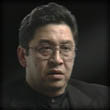
 |  | 
Dr. Kanatjan Alibekov was the former First Deputy Director of
Biopreparat from 1988 to 1992. Biopreparat was the Soviet Union's
biological-weapons program. Alibekov defected from the Soviet Union and moved
to Washington, DC in 1992.
|  |  |

What's the truth about Sverdlovsk? What actually happened?
Now people know that there was a special military settlement in Sverdlovsk. For
a little period of time that settlement was involved in research and
development, and manufacturing of biological weapons. One of the main purposes
of that facility was to manufacture biological weapons on a basis of anthrax
and they had a lot of weapons stockpiled--hundreds of tons. They manufactured
anthrax on a permanent basis. That Friday night, because of the personnel's
negligence, they removed a filter from an exhaust system and didn't put it
back. When a new shift came they started the technological process and ... this
material went out.
On Monday morning, the new filter wasn't on?
It's very difficult to say when, but I don't believe that the installation was
without a filter for such a long time. Probably they found that there was no
filter in a short period of time.
But not short enough to stop anthrax spores being released?
Yes, maybe minutes, maybe an hour or hour and a half, no more.
The wind blew the anthrax spores, as I understand it, away from Sverdlovsk.
If the wind had been blowing the other way back into the city of Sverdlovsk
what could the death rate have been?
Dozens of thousands, maybe hundreds of thousands.
When the accident happened, the Soviet Union simply lied about it. Why were
the Soviets so worried about that accident?
Because, first of all, the Soviet Union ... [had] signed a treaty not to
conduct any type of this work. Second, if the Soviet Union admitted that it was
a case of infecting people by a biological weapon, it's very difficult to
imagine what kind of consequences we could expect, because even when people
didn't know the real cause of that accident, people were scared. But if they
knew that it was a case of people's negligence and that a military facility
infected and diseased people, it's very difficult to imagine what kind of
consequences [there would have been].
Nobody seems to know whether that strain of anthrax was antibiotic resistant
or not.
It was a regular strain used to manufacture biological weapons.
It wasn't antibiotic resistant?
No.
When you look at Sverdlovsk, when you look at some of the intelligence that
was being floated even back as early as the late 70s, why do you think the
U.S. did not catch on sooner that there was a huge offensive program going
on?
As far as I know, the intelligence community here in the United States and in
Great Britain was 100% convinced that the Soviet Union had such a program. The
problem was [that] there were some scientists, some consultants who believed
that the Soviet Union didn't have this program, and that the Soviet Union
observed the treaty on banning biological weapons.
So the inability of certain scientists in the United States to believe the
intelligence reports, in the long run, prolonged the length of the
program?
When we discuss such sensitive things, we cannot rely just on the opinion of a
couple of scientists or even a group of scientists. This type of analysis
should be conducted openly, using watch panels, very respected scientists and
representatives of the intelligence community.....The intelligence community
was absolutely right when it insisted that [the U.S.] had such a problem.
Was the anthrax leak in Sverdlovsk a point where you or others in the Soviet
Union thought that the program would be uncovered?
For me as a physician, I thought this type of epidemic would be very, very
suspicious, because I don't remember any epidemic of anthrax with such severity
... anthrax is a disease, it doesn't cause huge epidemics. And the amount of
people infected simultaneously usually is not very high: five people, ten
people, maybe twenty people. Some of them would have cutaneous form or skin
form of anthrax. But when we saw dozens of cases of inhalation anthrax, this
situation is very suspicious and could be caused by an anthrax aerosol. It was
in my opinion, a clear explanation what was the real cause of that epidemic.
If the United States had caught on at that point and made a big fuss back in
1979, what do you imagine the effect would have been?
I believe, if in 1979 this country had started pressuring the Soviet Union
severely [like it did] in 1990, by the middle of 80s, this program would have
been dismantled in the Soviet Union.
 |